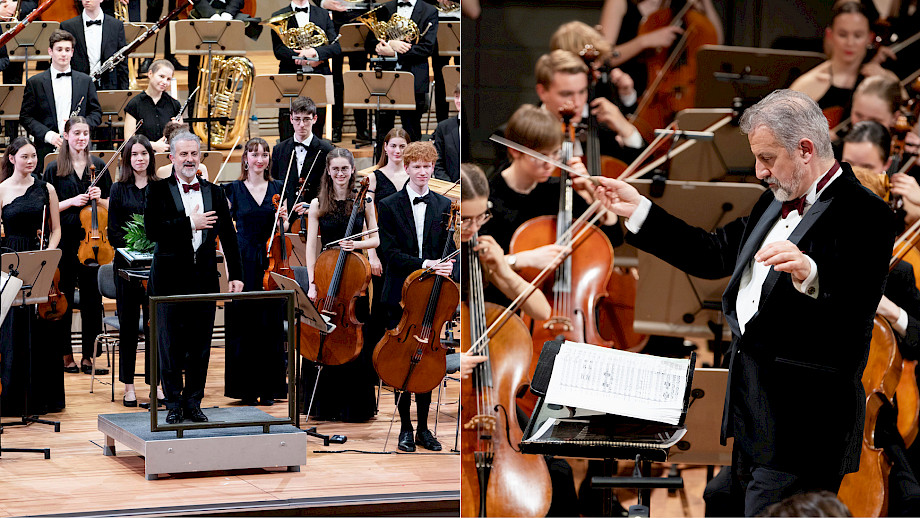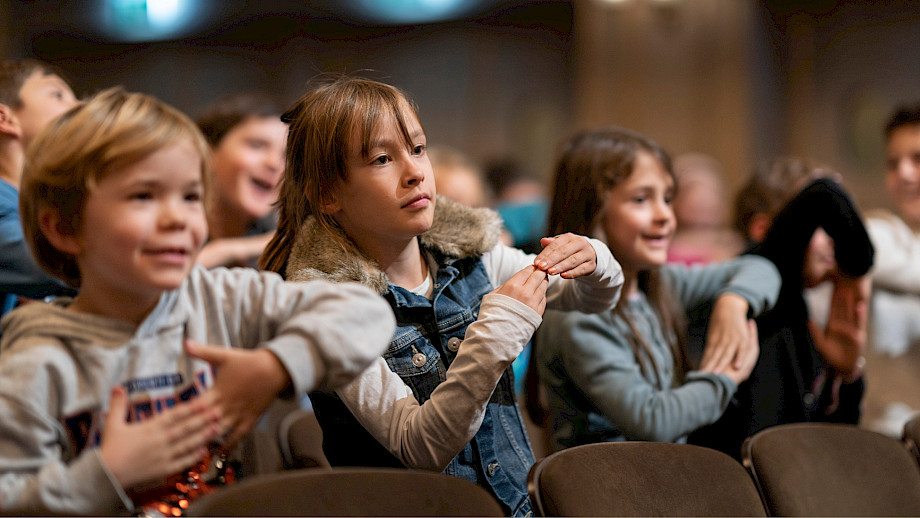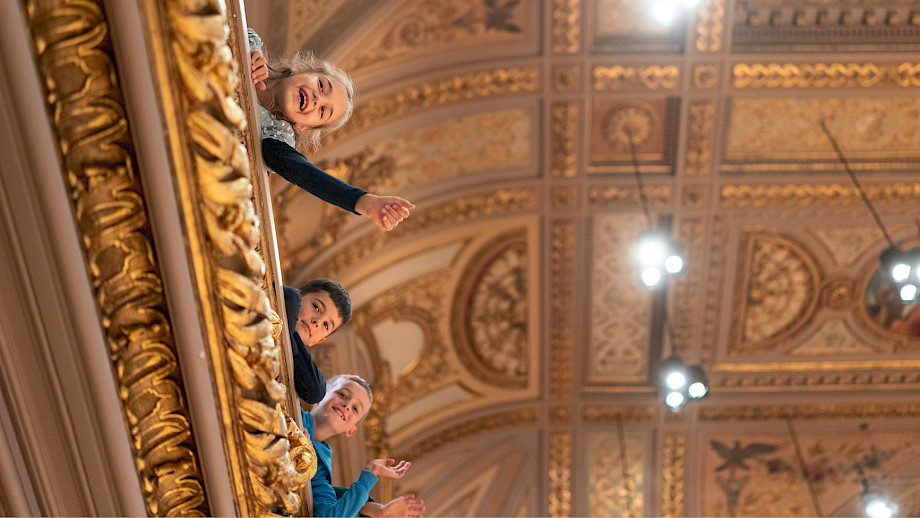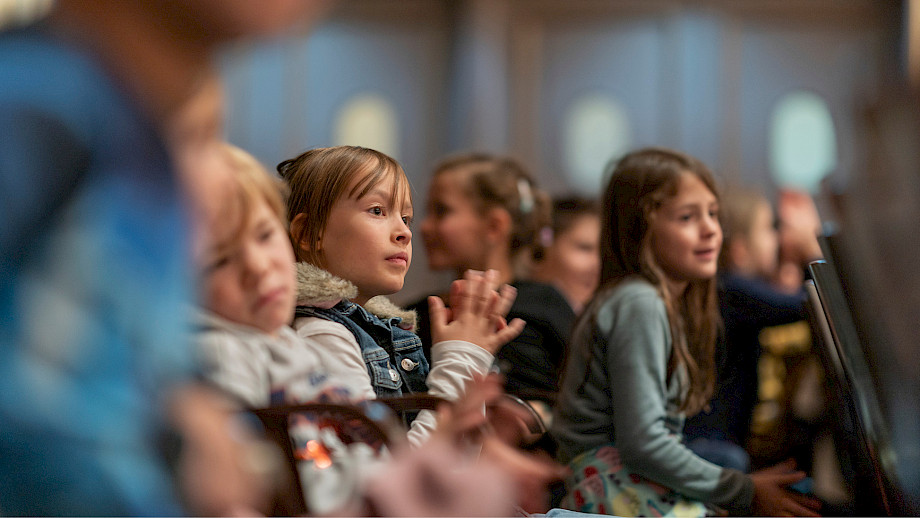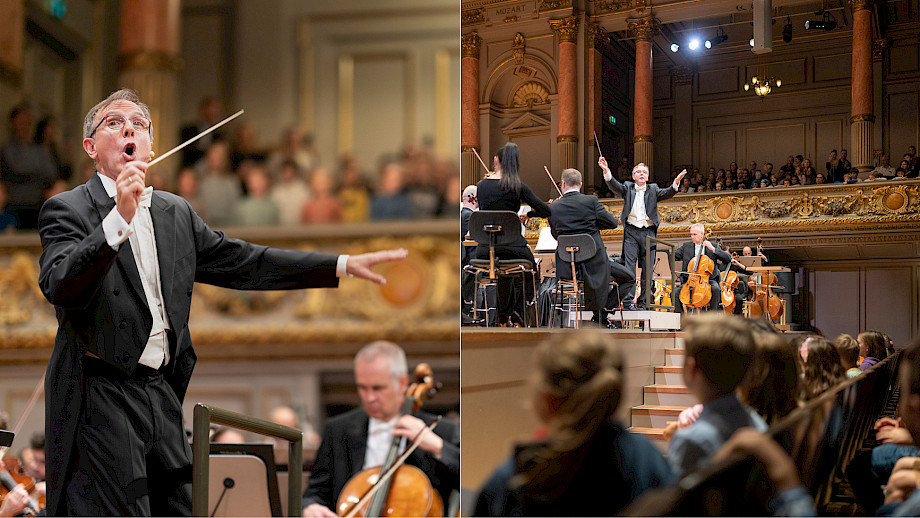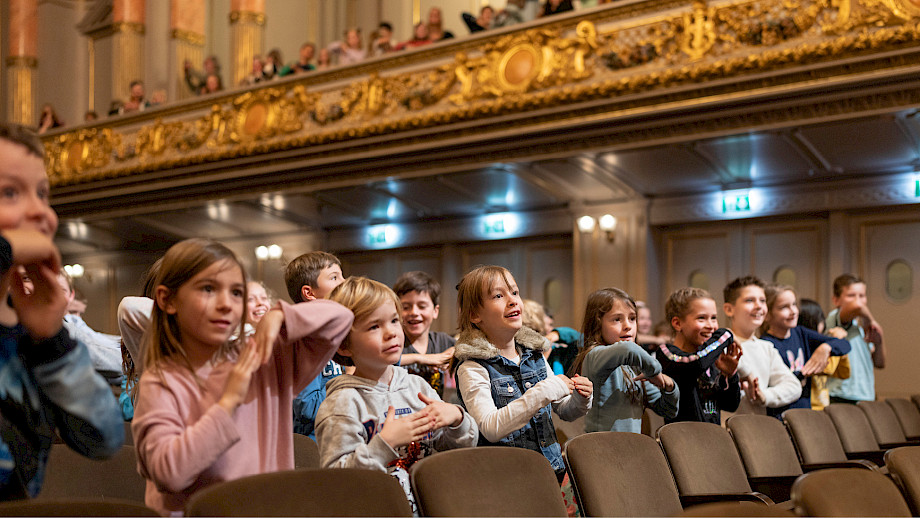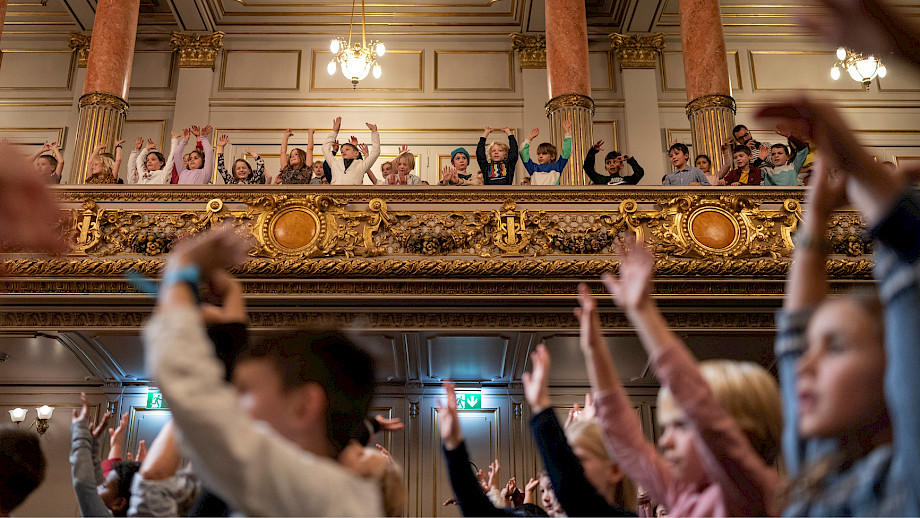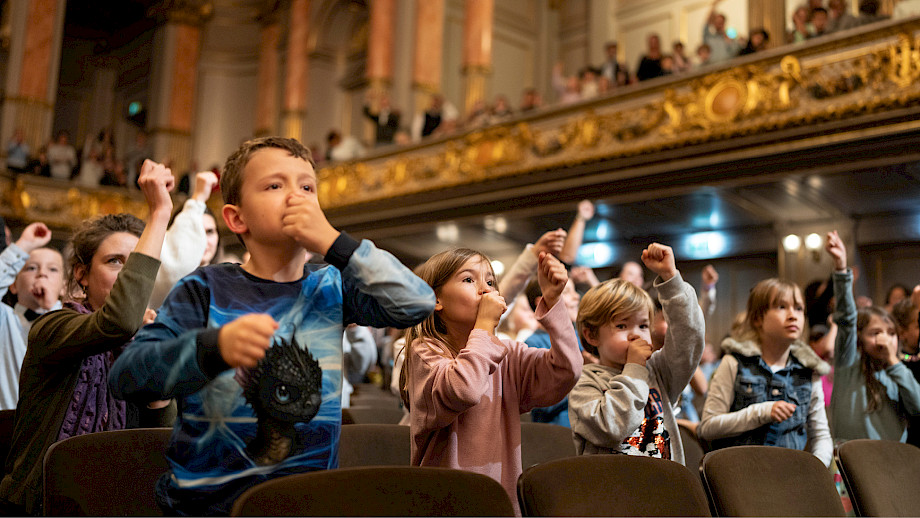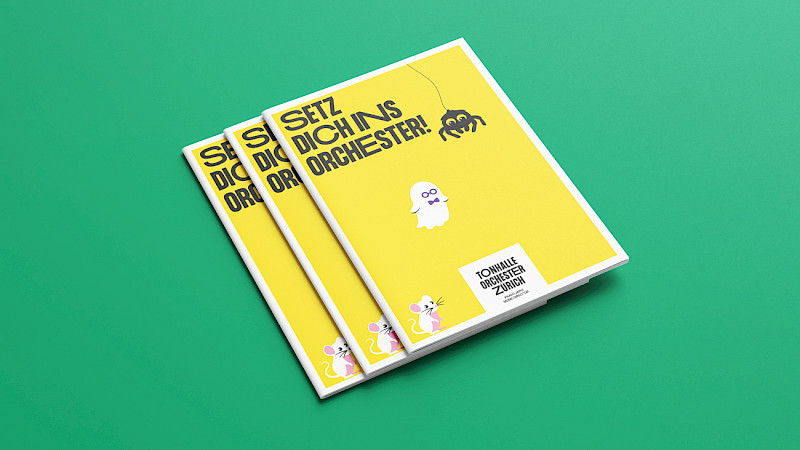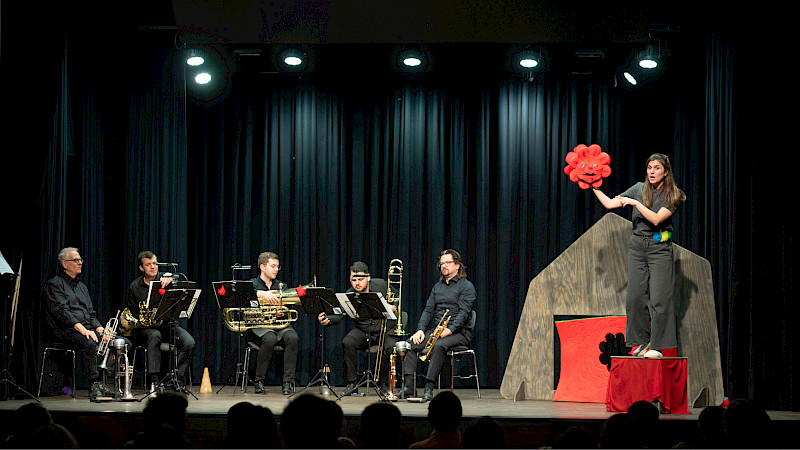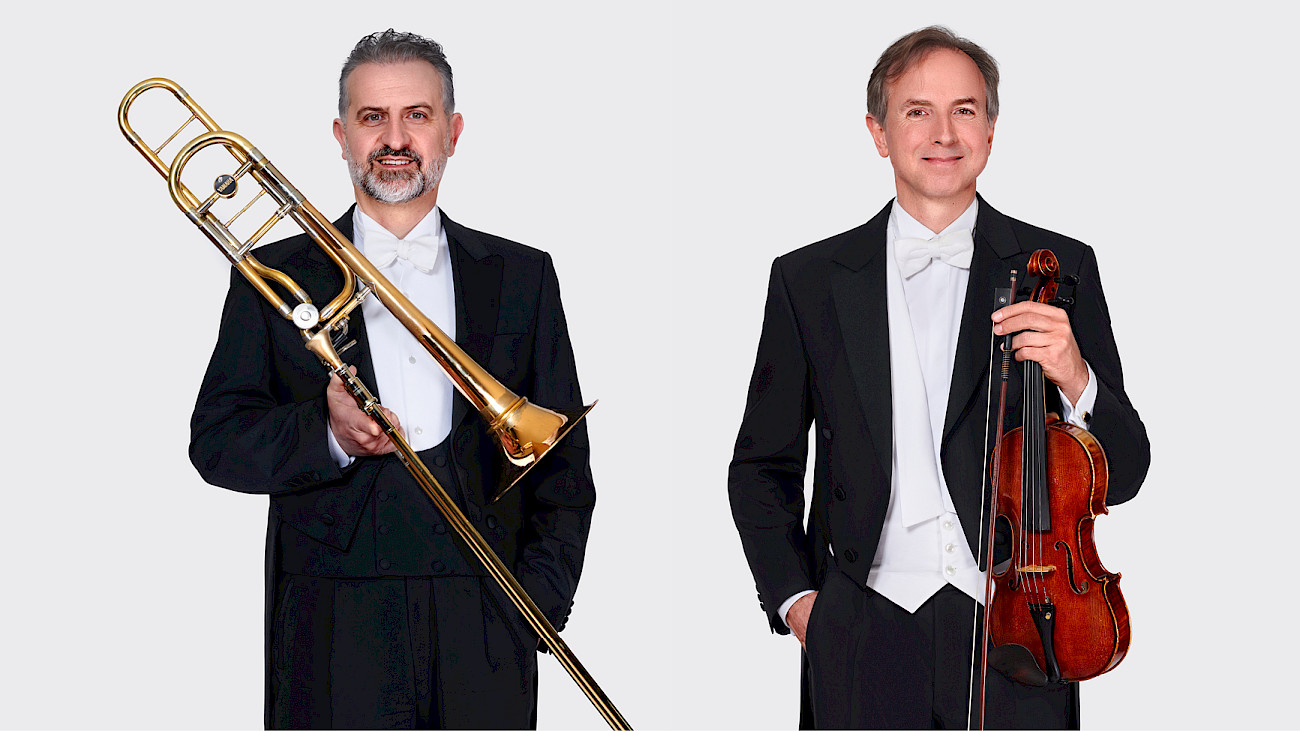
"Then I'm completely in the flow"
Two musicians from the Tonhalle-Orchester Zürich regularly conduct children's and youth projects. In close dialogue with each other - and yet very different.
David Bruchez-Lalli
"The first time I conducted the Tonhalle Orchestra Zurich was as a stand-in, 14 years ago, at the family concert with the film 'The Snowman'. I only had two weeks to prepare, and for the last three days I thought about what I should say first when I stood in front of the orchestra. When I went up to the podium, I still didn't know! Then I simply said: 'This is a strange prospect for me, and I'm sure for you too. I'm nervous, let's get started'
Since then, I have often conducted, especially for children's and youth projects such as 'Mittendrin'. The focus there is on teaching, we want to pass on the joy of music to the children. It's not about my ambitions as a conductor, but above all I have to make sure that everything runs efficiently, that I have contact with the children and that I integrate the orchestra well. I can sense very quickly if there is negative or too much positive energy somewhere in the hall, and you have to balance it out quickly.
When the children come into the hall for the concert rehearsals, I already know them. I always do workshops with them beforehand. In this context, I would definitely like to mention that these projects are teamwork: We work very closely with Mara Corleoni, Lisa Wyss and Yvonne Gisler from the music education department, they organise the whole thing and we also plan the programmes together and with Marc Barwisch.
In the past, I sometimes put on two different coloured shoes for the first meeting with the children, then they could choose which one I should wear at the concert. That creates an immediate connection. And when I'm on stage, with my still rather French-coloured German, they like it. Perhaps it's precisely because of my language that they don't feel lectured to, not like at school; that helps.
I've always been interested in conducting, I started doing it during my studies - without an official degree, though, because I got a job as a trombonist very early on. I first played in the opera house, then in 2006 I moved to the Tonhalle Orchestra Zurich as principal trombonist. With this instrument, you sit at the very back of the orchestra and you have lots of breaks. I always observe what the conductor is doing at the front, what works and what doesn't. I learnt a lot that way. I've learnt a lot that way.
In addition to the educational projects, I have been conducting the Zurich Youth Symphony Orchestra (JSOZ), our orchestra's junior music partner, for nine years. The approach here is different to the children's projects; it's really about musical development. The young people are usually involved for around three years, we have two performances a year in the Grosse Tonhalle, plus a concert tour abroad. The programme consists exclusively of masterpieces; the best thing about it is that they always work. Once you crack the code, all the emotions are there, even in a performance with a youth orchestra.
Most of the orchestra members are new to these works. I myself have often played them, but never conducted them. However, it sometimes happens that I do a work for the second time: Dvořák's Symphony No. 8 is coming up this autumn, as was the case at my very first concert with the JSOZ. I'm looking forward to it: I've already made the necessary mistakes the first time, now it's really starting."
Christopher Morris Whiting
"I moved from the opera house to the Tonhalle-Orchester Zürich in 1999, just in time for the first edition of 'Mittendrin'. Initially I was there as a violinist, I played in the orchestra and showed the children in workshops how a violin works. They are allowed to try out all the instruments in this project - not our own, of course, but instruments on loan from Musik Hug.
I have been conducting the performances for twelve years now, alternating with David Bruchez-Lalli. During this time, we have tried out and learnt a lot. The interaction between the orchestra and the 300 children spread throughout the hall now works really well. And above all, we know what second and fifth-graders are capable of! The songs are more challenging than they used to be, but they manage it. Last autumn, for example, we sang 'W. Nuss vo Bümpliz' by Patent Ochsner in an arrangement by our clarinettist Florian Walser. It's not easy for the orchestra; if you notate pop songs exactly, they are often difficult to read. But the children did it by ear and the parents also sang along. We were all really inspired.
When we go into the classes for this project and the children come to us afterwards, they experience many things for the first time. They learn how to follow a conductor, how a symphony orchestra works and what the different instruments can do. For a few years now, we have also been organising a conducting workshop for everyone, where they can interpret a simple piece however they like: funny, sad or angry, fast or slow. In this way, they learn that a conductor doesn't just perform, but can really make a difference.
I myself came to conducting through a key experience. It was during my bachelor's degree as a violinist in San Francisco. At the time, the university orchestra was used for the master's conducting class, and the professor said at the beginning that the orchestra members were also allowed on the podium at the end of the week if they wanted to. I practised like crazy, I wanted to take on the first movement of Stravinsky's 'Petrushka', which is very complex in terms of rhythm and interplay. It went incredibly well, also because the orchestra could have easily played the piece on its own after a week. I was really high - you chase after that feeling for the rest of your life. But I would never give up the violin either: playing it myself is something incredibly sensual, I couldn't do without it.
When I'm on the podium at one of these 'Mittendrin' concerts, it's not a job, it's a vocation. I'm taken back to the time when I was the same age as these children and dreamt of becoming a musician - I had already written off a career as a baseball player back then. When I see how much they are into it today, I forget everything else, I'm completely in the flow.
And of course I'm happy when they carry on the experience afterwards. Most of us stay in the orchestra for decades, we have a close relationship with the city and the people here, not least thanks to projects like this. Sometimes I'm recognised on the street by children who used to be in the orchestra. And an orchestra colleague recently told me that her son still sings 'W. Nuss vo Bümpliz'. When I hear something like that, it motivates me to embark on further musical adventures."
Recorded by Susanne Kübler




